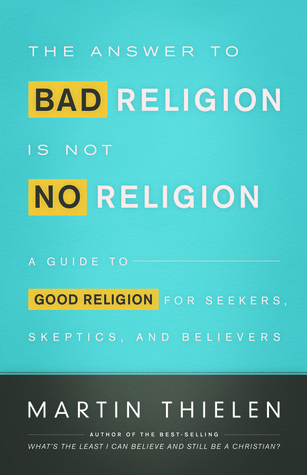
The Answer to Bad Religion is Not No Religion, Martin Thielen. Louisville: Westminster John Knox Press, 2014.
Summary: Discusses the characteristics of “bad religion”, contending that the answer is not to reject religion altogether but to embrace “good religion”, the marks of which are discussed.
Imagine there’s no countries
It isn’t hard to do
Nothing to kill or die for
And no religion too
Imagine all the people
Living life in peace’(John Lennon, “Imagine”)
John Lennon is not the only figure to imagine that the world would be better without religion. Martin Thielen considers that for many who have had bad experiences, particular as he had in conservative, judgmental contexts, the temptation is to give up altogether on “the religion thing” and maybe consider that one’s life, if not the world would be a better place where people lived in peace. Thielen makes the case that there is a third alternative –better religion, which he describes in terms of his migration to mainline Protestantism.
After describing his own journey, Thielen discusses the marks of bad religion: self-righteous judgmentalism, negativity, arrogance, intolerance, and absolutism, partisan politics and excessive nationalism, and a nominal commitment to Christ and church. This last was interesting because he takes on the fact that for many church-goers, the local Rotary or their kids soccer teams, or their travel plans take precedence to worship, giving, and service in a church, which gets marginalized.
Thielen then discusses the “no religion” alternative and contends that this would create an “always winter but never Christmas world” and that religion, and particularly the Christian faith provides meaning, transcendence, ethics and law, inspires great art and more. Religion has resulted in universities, hospitals, is the source of much charitable activity, and stood against many injustices. And I think he raises a good point. Many atheists would also support much of this, but the question is, in the absence of a religious heritage and the cultural capital this has created, would atheism create and sustain these cultural goods?
The book then concludes with a description of “good religion”: which impacts our whole lives, engages in service, provides a prophetic voice in society, builds community, is hope-filled, open-minded, forgiving, grateful and practices evangelism with integrity. The chapter on forgiveness was particularly helpful with practical steps for practicing forgiveness with safeguards about forgiveness when people are physically or emotionally dangerous to the one forgiving. There are also appendices on additional resources and how we should view the Bible–seriously but not always literally.
There was much here I thought helpful. In my work in collegiate ministry, so many of the militant atheists I’ve met came out of the bad religious experiences described in the first part of his book. How I wish for many of them to see that the alternative to their bad experiences is not no religion but something better. Thielen writes in an accessible style with a number of stories from pastoral ministry to illustrate his points. And the kind of “religion” he argues for as an alternative is certainly far more commendable and attractive.
There are two things that particularly concern me. One is the problem of the excluded middle. He assumes two poles: either conservative, narrow, judgmental, intolerant churches, or the mainline characterized by all the qualities of goodness he describes. It seems that he leaves Catholics and Orthodox believers out all together, nor does he recognize the many more progressive evangelical churches that still are scripture focused, Christ-centered, and reflect the same qualities that he contends for in “good” religion.
My second concern is the use of the term religion and the association of this with lots of good works as opposed to bad tendencies. The work of Christ was not absent from his account, particularly so in the chapter on the hope of the resurrection, but it wasn’t clear to me that this was central. While I can concede there are certain legitimate uses of the term “religion” in connection with Christian faith, I have always appreciated that idea that Christianity is about redemptive relationships, both with God through Christ, and with others, not “religion”, and the good works are works of love that flow from being the beloved redeemed children of God.
The value of this book lies in the argument suggested in the title that for those who have encountered bad religion, there is something better than no religion. If the book helps those who have had bad experiences with the church consider that this may not be what all Christians are like and, like the author, take the risk to see if others could be different, then the book will have accomplished its purpose. If the book helps those who sense their own brand of “religion” is unhelpful to figure out why, this would also be helpful. However, I think it would have been better if the author could see beyond recommending just his own type of church as the alternative to bad religion. Might that also be “good religion”?
Disclosure of Material Connection: I received this book free from the publisher via Netgalley. I was not required to write a positive review. The opinions I have expressed are my own.
Editor’s Note: Thank-you to Bob Trube for sharing his reviews with Emerging Scholars! Bob first posted the above review on Bob on Books. ~ Thomas B. Grosh IV, Associate Director, Emerging Scholars Network
Bob Trube is Associate Director of Faculty Ministry and Director of the Emerging Scholars Network. He blogs on books regularly at bobonbooks.com. He resides in Columbus, Ohio, with Marilyn and enjoys reading, gardening, choral singing, and plein air painting.

Leave a Reply